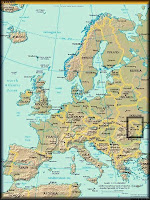Introduction
Europe is the most developed and the oldest continent but sometimes Europe’s security is affected by outside or inside dangers. The Cold war affected whole world. Of course, it became effective in Europe. Soviet expansionism was threatening European security. However, on the other hand, today’s Europe can be more insecure than the Europe during the Cold war.
Hence, this article will examine the Europe’s safety in today and at the height of the Cold War into 2 sections. Firstly, it will show that Europe is a safer place to live in now compared with at the height of the Cold War with definite reasons and examples, such as it will mention about the today’s conditions of Europe; disappearing of the Soviet Union danger and the membership of former Soviet satellites states to the European Union and the NATO. Secondly, this article will show Europe is not a safer place to live in now compared with at the height of the Cold War, such as I will mention that the powerful Russian Federation of today, Russia’s energy card on European politics, Islamic Terrorism in Europe, and ethnic minority nationalism and its effects on European security. Finally, in the conclusion section of this article, it will ensure overview of the analysis, briefly, and it will mention what it did in this article.
Why is Europe a safer place to live in now compared with at the height of the Cold War?
After the collapsing of the USSR, many things changed in Europe and it became the safer place to live because, there are some reasons that made Europe a safer place to live when people compared with at the height of the Cold War. These reasons are collapsing of USSR, reunification of Germany, expansion of the European Union into Eastern Europe and we call this as new Europe, and NATO membership of former Soviet Satellite States.
The cold war affected the Europe, especially Eastern Europe. Because, after the Word War II, the USSR occupied many Eastern European states such as Poland, Czechoslovakia, Bulgaria, Romania, etc. Even Germany divided into 2 states as German Democratic Republic (East Germany as Communist) and Federal Republic of Germany (West Germany as pro-west). Communism had spread into all Eastern European states through Soviet expansionism policy and also it was affecting the rest of the Europe. The Union of Soviet Socialist Republics and her satellite states in Europe, such as Bulgaria, Romania, Poland, East Germany, Hungary, Czechoslovakia, etc. affected European security. Actually, this was the result of the Soviet Expansionism Policy. This situation divided Europe into two blocs; Western Europe mainly NATO countries and Eastern Europe mainly Warsaw Pact Countries that is divided with something calls as iron curtain. Also, there was a possibility of nuclear war between two blocs. This situation continued until the collapsing of the Soviet Union in 1991. Today, there is Russia but she cannot threat European security as did the old Soviet Union.
‘After the Second World War, Germany was divided into the democratic West and the Communist East (German Democratic Republic). The Berlin Wall became the symbol of this division. It fell in 1989 and Germany was reunited a year later’ (Europe, 2009). West Germany is a member of NATO and East Germany is a member of the Warsaw Pact. So, both sides are rivals and both sides can threat security of each side. West Germany was a member of the European Union at the beginning of the European Union. When East Germany reunified with West Germany in 1990, East Germany became a part of the unified Germany that is Federal Republic of Germany. Hence, the security problem was solved between two sides of Germany through reunification of Germany because today, there is one Germany that is a member of the European Union and NATO.
All these two reasons that I mentioned above show the security problems in Europe during the cold war. Maybe, these problems are solved when the Soviet Union collapsed. However, after the collapsing of Soviet Union, the problem was Soviet satellite states in Europe. Because, nobody knows what would happen the Soviet satellite states and how they would behave toward the Western Europe. Because of this, the democratization process was started for Eastern European countries by NATO and European Union. ‘The Madrid summit in 1997 saw the formal invitation issued to Poland, the Czech Republic and Hungary to join the alliance. At the top, the alliance ‘recognize[d] and welcome[d] the continuing efforts and progress in both Romania and Slovenia.’ Next, it ‘also recognize[d] and welcome[d] continuing progress in Estonia, Latvia and Lithuania’ (Croft, 2002: 101). As a result, for guarantying European security and providing stability at Balkans, NATO enlarged into ‘Czech republic, Hungary, Poland in 1999, Bulgaria, Estonia, Latvia, Lithuania, Romania, Slovakia and Slovenia in 2004, Albania and Croatia in 2009’ (NATO, 2009). These were direct effects of NATO expansionism for European Security but there are indirect effects of NATO expansionism toward Eastern Europe. ‘Certainly, there are factors related to NATO enlargement that could enhance collective security. For instance, Bulgaria and Romania’s entry into NATO strengthens European borders against transnational threats, such as arms smuggling, illicit narcotics, the trafficking of people, terrorism, and international crime’ (Adamski, 2006: 78).
As NATO, the European Union enlarged into Eastern Europe that is mainly former Soviet satellite states. Czech Republic, Estonia, Hungary, Latvia, Lithuania, Poland, Slovakia became a member of the European Union in 2004. Also, in 2007, Bulgaria and Romania joined the European Union. As a result, both membership of the EU and the NATO of former Soviet Satellite states made Europe as a safer place to live now. Because, there is no security dilemma in Europe, and their policy is all most same, today. Hence, differences on politics and mentality finished in Europe and new Europe was born as a more secure place.
Why is not Europe a safer place to live in now compared with at the height of the Cold War?
On the other hand, The USSR could be collapsed in 1991 but Europe is still insecure place. One of the reasons is Russia is still powerful and effective as politically. The other reason is that the most of European countries depends on Russian energy such as natural gas. Also, the problem is not only Russia, Islamic terrorism after 9/11; new settlers in Europe and ethnic nationalism within European countries can be danger for Europe’s security.
Firstly, after the collapsing of the Soviet Union, the danger of the Soviet expansionism and the possibility of a nuclear war between two blocs could finish but the continuing state or successor of the USSR that is Russia Federation is still strong as militarily. Also, in 2000s Russian economy started to growing, again. They are not same Russia in 1990s as economically. ‘Russian growth in 1999-2003 averaged slightly above 6.5 per cent per annum. Annual growth rates, partly driven by changes in the terms of trade, fluctuated between 4.7 and 10 per cent’ (World Bank, 2003: 5). Hence, Russia is still powerful and they can affect Europe, especially Eastern Europe. This economic growth is mainly supported by Russian Energy industry. Today, most of European countries depended on Russian natural gas. Moreover, Russia uses the energy card on politics, sometimes. Of course, this situation affects Europe. ‘The Russian gas giant, Gazprom cut supplies to Ukraine on 1 January 2006 because of the failure to reach agreement. Ukraine, and some Western commentators, said Russia was trying to punish it for attempting to withdraw from Moscow's sphere of influence and to strengthen ties with the European Union and Nato’ (BBC News, 2006). Maybe, Russia lost Eastern Europe countries and Baltic countries when they started to join the European Union and NATO but Russia can be effective in Europe through her energy card on politics. ‘The larger or wealthier member states, led by Germany, Austria, France and Italy appear significantly less concerned than the newer EU members to their East about becoming more dependent on Russian energy resources. Still more troublesome, they are increasingly willing to be partners for a Kremlin determined to play a larger role in Europe’s internal decision making. This may stem from an over confidence in the combined strength of the EU and of its ability to ward off any attempt by Moscow to dominate or distort Europe’s financial and economic institutions resulting from growing energy dependence on Russia’ (Keith, 2008: 37).
Secondly, after 9/11 terrorist attack in the USA, the world became less secure. Also, after this event, one term came out that is called as Islamic Terrorism. Of course, this situation affected Europe. This kind of terrorism started to affect mainly Christian Europe. For example, ‘an Algerian terror group which bombed the Paris Metro in 1995, killing eight people and injuring 200’ (Singer, Horward, 2005: 238). Also, in 7th July of 2005, there were some suicide bomb attacks in metro stations of London.
Thirdly, there were ethnic nationalism or minority nationalism in Europe in the Cold War era but nowadays, ethnic nationalism or minority nationalism is more effective in Europe. Because, the European Union policy is mainly on decentralization and this process gives minorities some rights. With these rights minorities within countries became more powerful and in some European countries, they started to violate others rights. Such as in Spain, the Basques and their terrorist organization; Basque Fatherland and Liberty that is called ETA (Euskadi ta Askatasuna). ‘Soon after 9/11, ETA set off car bombs in Vitoria and Madrid, injuring one hundred people but missing the government official targeted in the attacks. In December 2003, the Spanish police said they foiled an ETA plot to detonate two bombs in a Madrid train station. In March 2004, on the eve of the Spanish national election, bombs planted on commuter trains in the Spanish capital killed two-hundred people and injured hundreds of others. (Council on Foreign Relations, 2008)
As a result, the cold war had been affect Europe’s security but after the collapsing of the Union of Soviet Socialist Republics (the USSR), insecurity of Europe is continuing, maybe today, Europe is more insecure place rather than the Cold War era when we look at the reasons that I mentioned above.
Conclusion
Security issue of Europe is very critical issue. One side can say that Europe is a safer place to live in now compared with at the height of the Cold War, but on the other hand, other side can say that there is no threat of the Soviet Union but there are other factors, today and they can be more effective and dangerous than the Soviet Union threat in Europe. Hence, Europe is not a safer place to live in now compared with at the height of the Cold War. Thus, this article tried to show two different opinions about the security issue of Europe with some examples and analysis. Firstly, it tried to explain with some reasons such as collapsing of the U.S.S.R., European Union and NATO membership of former Soviet Union satellite states in Europe. Secondly, it tried to show why Europe is not a safer place to live in now compared with at the height of the Cold War. It also gave some good examples about insecurity of Europe after the cold war in this section. It did not focus only the Russian effect on the security issue of Europe. Moreover, it tried to explain this insecurity issue of Europe with Islamic terrorism, especially after 9/11 event, ethnic nationalism or minority nationalism in European countries.
As a result, Europe can be a safer place to live in now compared with at the height of the Cold War or not, it depends on people’s insights on this issue.
İsa Burak GONCA
References:
1)Adamski, J. (2006) Old Europe, new security: evolution for a complex world. Ashgate, Aldershot.
2)BBC News (2006) Ukraine gas row, 4 January. Available at:
http://news.bbc.co.uk/2/hi/business/4569846.stm (accessed on 16 May 2009)
3)Council on Foreign Relations (2008) Basque Fatherland and Liberty (ETA) (Spain, separatists, Euskadi ta Askatasuna), 17 November. Available at:
http://www.cfr.org/publication/9271/ (accessed on 16 May 2009)
4)Croft, S. (2002) The Enlargement of Europe, ‘International Affairs’, (Royal Institute of International Affairs 1944-), Vol. 78, No. 1. pp. 48-132
5)EUROPA (2009) Member States of the EU - Germany, Available at:
http://europa.eu/abc/european_countries/eu_members/germany/index_en.htm (accessed on 16 May 2009)
6)Keith C. S. (2008) EU Soft Security: Myth or Reality? Russian Economic Pressure on EU’s Central European Members, CSIS, Washington.
7)NATO (2009) NATO Enlargement, Available at:
http://www.nato.int/issues/enlargement/index.html
8)Singer, D. & Howard, Z. (2005) Deserter from death: dispatches from western Europe, 1950-2000, Nation Books, New York.
9)World Bank (2003), Russian Economic Report No. 6: August 2003, Washington, DC, August





































